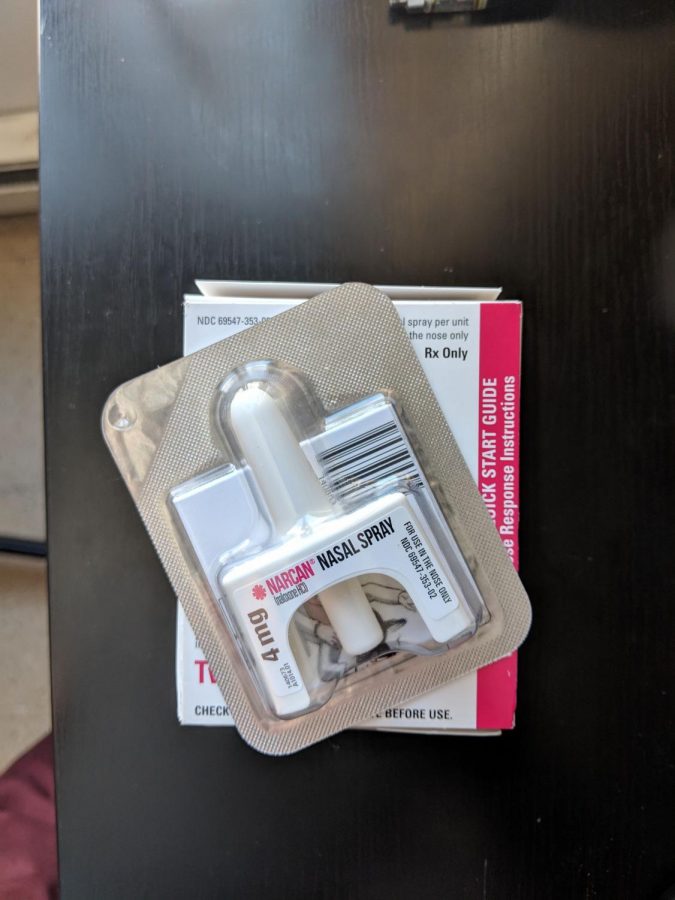Students who bring overdose victims to hospital won’t be charged with possession
Narcan nasal spray can reverse the effects of an opioid overdose until proper medical care can be given.
February 22, 2019
The number of drug and alcohol-related emergencies involving CWU students has risen over the last year, according to Wellness Center Assistant Director Doug Fulp.
Fulp said that he attributes the rise in hospital calls and transports to students taking advantage of the good samaritan law, also known as RCW 69.50.315. The Washington law states that, “a person acting in good faith who seeks medical assistance for someone experiencing a drug-related overdose shall not be charged or prosecuted for possession of a controlled substance,” according to Center for Opioid Safety Education, which, according to Fulp, has made the decision to call for help much easier for students.
The bulk of the emergencies have been the result of over-consumption of alcohol, but there have also been some recent incidents involving the mixing of multiple substances, according to Fulp. He said that for some people, the crossing over of different drugs can make it hard to keep a hold on reality.
“And so for that person, they might not identify that as an overdose,” Fulp said. “But, from my perspective, if you took a substance and you had an undesired outcome from it, I would consider that an overdose…so when we talk about good samaritan, I say it’s good for everything, alcohol, cocaine, heroin, ecstasy, molly and marijuana.”
According to Fulp, each time a student receives an assessment or treatment from the paramedics, a report is sent to him. He then reaches out to the student and suggests that they come in and discuss what happened. He said only about a third of the students he contacts are willing to come in and talk.
Some students, if hospitalized with no evidence that someone else used the good samaritan law, will find themselves in Fulp’s office as a result of a CWU sanction, according to Fulp. Students who are found in violation of CWU policies, such as showing up to class under the influence of restricted substances, will also end up meeting with Fulp. He said that, although they have no choice in the matter, the conversations are no different from those he has with willing participants.
“Come talk to me, let’s talk about this honestly and openly, you can ask honest questions and I’ll give you honest answers in a confidential setting so that way you understand what the heck happened,” Fulp said.
Community Health Doctor John Asriel said that one of the biggest reasons people struggling with drug abuse and addiction don’t always seek out treatment and/or medication is the stigma that surrounds drug use, and that being in a rural area like Ellensburg may amplify that stigma.
“For many years, we’ve thought of [addiction] as a character weakness and the treatment being to develop the character strength to not use,” Asriel said.
Fulp said that the reported number of students using more illicit drugs like MDMA, cocaine, prescription opioids and heroin is low. He believes that the reports are not accurately representing usage on campus, and that a big reason for that is the stigma that surrounds these drugs.
Fulp thinks the actual number of students experimenting with hard drugs is higher than reported, and one of the big reasons is the ‘college effect’. He said some college kids feel like they’re invincible, and believe that they would never be the ones to end up in the hospital. Fulp said that some students are after the college experience depicted in films like “22 Jump Street,” complete with parties, lots of booze and drugs.
If you think you are developing a substance dependency, or are concerned that a friend of yours might be, the first and easiest step is to come into the Wellness Center Fulp said.
“People can talk to me about what’s going on, I’m not writing things down to identify policies or laws that might be at play. For me, I’m more worried about that individual and what they have going on and the health risks that are involved,” Fulp said.




Class of 2005 • Feb 23, 2019 at 8:31 pm
I was the largest cocaine dealer at Central Washington University for several years in the early 2000’s. I had eventually given all that up after a very traumatic robbery experience. The entire time I was doing all of that I was way out of my league and in over my head. I was doing it to be cool and support my habit. I cleaned myself up after the robbery. 6 months later in Spring of 2005 – stupid drunk, I walked into a room at Creekside party where a couple of guys were snorting a white powder. Out of respect for my past stature they offered me some – I declined thinking it was cocaine which I swore I would never touch again. “It’s OxyContin” They said. “It feels like a warm blanket.” They said.
I left Ellensburg in a haste in June of 2005, all but ran out of town, I went on to have a well established career and an even more established opiate habit for an entire decade. It ruined my life.
I am 2 years clean now through AA & NA and I am working towards repairing my trail of fire. I attest that there were an unlimited amount of narcotics on campus and in surrounding areas. Do not bury the problem with stupid statistics. Get deep with it. Go after problem students, pay some snitches, get the info, make the buys, press the charges, kick them out of school and scare the shit out of the next kid who try’s to be “cool.”